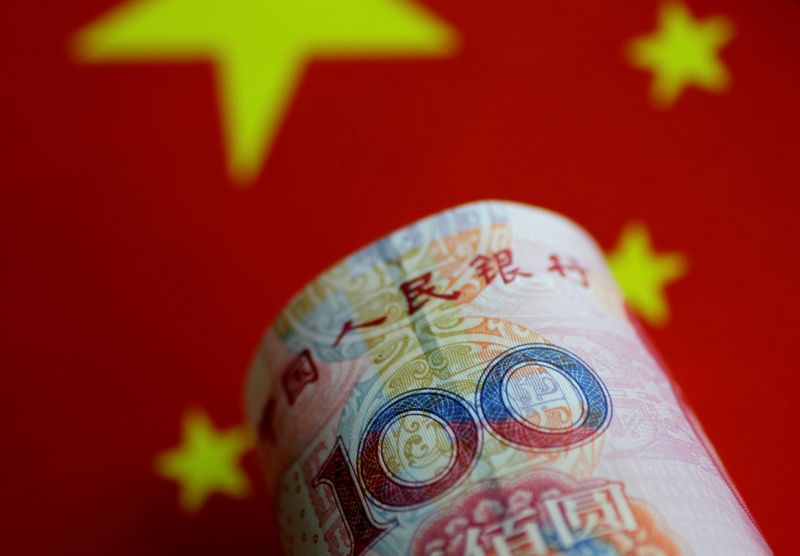 © Reuters. FILE PHOTO: A China yuan note is seen in this illustration photo May 31, 2017. REUTERS/Thomas White/Illustration
© Reuters. FILE PHOTO: A China yuan note is seen in this illustration photo May 31, 2017. REUTERS/Thomas White/IllustrationBy Anushka Trivedi
(Reuters) – Investors turned bearish on the yuan for the first time since April as China’s regulatory crackdown on private sector firms sent jitters through markets, while sentiment towards the Indian rupee improved from a fortnight ago, a Reuters poll found.
Short positions were raised on all other Asian currencies like the Philippine peso, Malaysia’s ringgit and the Thai baht as the region’s dire COVID-19 situation and prospects of broad dollar strength eroded their appeal.
All 13 responses for the poll were received, however, before the U.S. Federal Reserve Chair Jerome Powell signalled on Wednesday that the U.S. central bank was in no rush to start tapering its stimulus as the economy was “some ways away” from showing substantial progress on jobs.
Previous polls have shown investors reducing their long bets on the yuan since June but investors became firmly bearish this week after Beijing increased scrutiny over education, technology and property sectors, sparking uncertainty over future investments in the country.
Over the week, the yuan slipped below the 6.50 per dollar mark, stocks shed more than 4%, while the Chinese 10-year government bond futures fell 0.4%.
The Indian rupee was the only outlier, as bearish bets on the currency were trimmed by more than half.
India’s stock markets have been trading at record peaks since June, drawing record inflows of US$37 billion this year from foreign investors, as per National Stock Exchange data, setting the rupee up for its fourth straight weekly gain.
“The rupee is one of the better placed currencies in Asia given India’s sharp decline in COVID-19 cases over recent weeks,” said TD Securities analysts in a note.
Meanwhile, short bets on the low-yielding won were at their highest since May last year, as South Korea’s COVID-19 woes kept investors at bay.
The country suffered its worst wave of infections in July, like other developing Asia counterparts; Indonesia, Malaysia, Philippines and Thailand.
All of them imposed some form of curbs to arrest the infection rate, which prompted International Monetary Fund on Tuesday to scale back growth forecasts for most economies in the region.
The Reuters survey is focused on what analysts believe are the current market positions in nine Asian emerging market currencies: the , South Korean won, Singapore dollar, Indonesian rupiah, Taiwan dollar, Indian rupee, Philippine peso, Malaysian ringgit and the Thai baht.
The poll uses estimates of net long or short positions on a scale of minus 3 to plus 3.
A score of plus 3 indicates the market is significantly long U.S. dollars. The figures included positions held through non-deliverable forwards (NDFs).
The survey findings ASIAPOSN are provided below (positions in U.S. dollar versus each currency):
DATE USD/CN USD/K USD/SG USD/I USD/TW USD/IN USD/M USD/PH USD/T
Y RW D DR D R YR P HB
29/07 0.27 0.78 0.71 0.27 0.36 0.29 1.4 1.21 1.49
15/07 -0.15 0.27 0.53 0.23 0.13 0.68 1.06 1.06 1.56
01/07 -0.29 -0.29 0.02 0.36 -0.19 0.5 0.49 -0.04 0.85
17/06 -0.63 -0.36 -0.49 -0.5 -0.58 -0.21 -0.05 -0.31 0.2
03/06 -1.34 -0.51 -0.55 -0.4 -0.44 -0.71 0.32 -0.66 0.37
20/05 -0.33 0.43 0.37 -0.06 0.33 -0.03 0.26 -0.22 0.81
06/05 -0.52 -0.39 -0.58 0.31 -0.59 0.86 -0.04 -0.35 0.5
22/04 -0.17 -0.23 -0.44 0.56 -0.38 0.75 -0.03 -0.37 0.58
08/04 0.72 0.48 0.3 0.59 0.77 0.2 0.46 0.36 0.91
25/03 0.3 0.65 0.46 0.45 0.5 0.05 0.54 0.11 0.54

